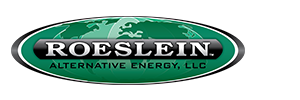Published by St. Joseph News-Press
Written by Greg Kozol
For years, sprawling hog farms in Northwest Missouri have deposited animal waste into nearby lagoons.
Bill Homann has always thought the manure could be turned into something more useful. Now, the director of administration and compliance at Murphy-Brown Missouri believes what’s known as digester technology has reached the point of allowing hog manure to be turned into a sustainable energy source.
“Let me say, digester technology in the livestock industry has been tried and tried and failed,” he said. “Technology continues to improve. We continue to strive to turn what we see as a waste product into sustainable energy.”
Murphy-Brown Missouri, formerly known as Premium Standard Farms, announced a $100 million partnership with Roeslein Alternative Energy to develop renewable biogas on nine finishing farms in Gentry, Mercer, Putnam, Sullivan and Worth counties. Mr. Homann expects lagoon covers to be installed on 88 Murphy-Brown lagoons in Missouri, with sites in Gentry and Worth counties covered by the end of the year.
“We feel pretty confident it will scale up nicely,” he said.
Roeslein, based in St. Louis, will use anaerobic digestion technology to capture biogas, a type of renewable natural gas created when organic matter decomposes without oxygen present. Similar technology has been tried on dairy farms and at landfills.
Under the agreement, Murphy-Brown provides the organic material — in the case, hog waste — and is responsible for transporting it into the covered lagoons using barn scraper technology.
From there, Roeslein will capture and refine the biogas, and transport it for use as an energy resource. “Environmental benefits from this project will be significant,” Rudi Roeslein, president of Roeslein Alternative Energy, said in a statement.
Mr. Homann said the technology will allow Murphy-Brown to make significant reductions to odor coming from its lagoons. He also said the barn scrapers, which he likens to a “big squeegee,” will represent an upgrade from the current technology that uses water to flush the waste into lagoons. That water, recycled from lagoons, can lead to odor problems.
Murphy-Brown intends to continue applying waste on nearby fields, but because the lagoons are covered, the company will no longer have to increase applications in the event of heavy rainfall in the spring.
“It’s still a very valuable fertilizer for us and our neighbors,” Mr. Homann said.
Mr. Homann said the project will offer immediate construction benefits in Northwest Missouri this spring when workers begin to install lagoon coverings, pumps and pipelines.
Murphy-Brown, a subsidiary of Smithfield Foods in Virginia, employs 1,070 in Missouri. The company has 112,000 sows in Missouri and produces 1.9 million market pigs a year.

